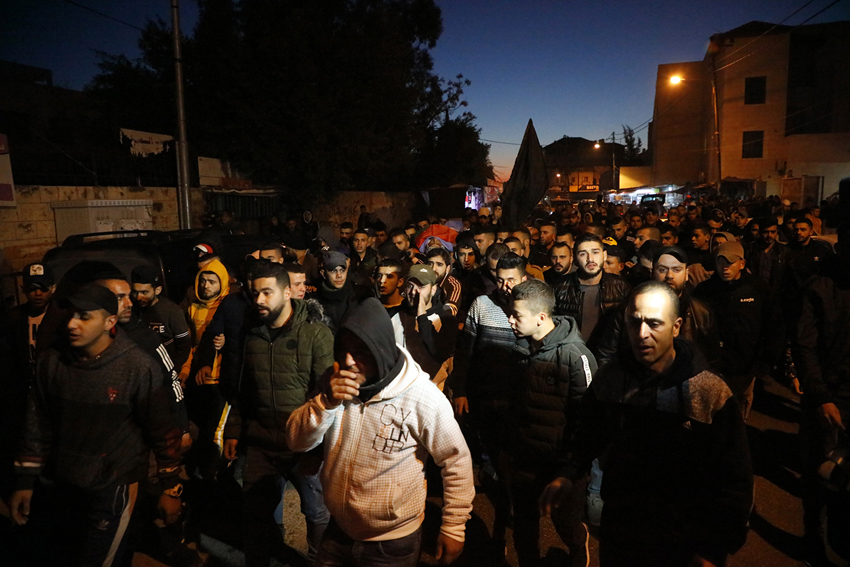ISRAEL continued its terror operation against the Palestinian Jenin refugee camp yesterday, with drones, airstrikes and missiles killing 10 Palestinians and injuring over 100 more.
The Israeli military attacked civilian areas and homes with helicopters, Mustafa Barghouti, a member of the Palestinian Legislative Council told the BBC.
He said they attacked Jenin’s main hospital with tear gas and that among those attacked were journalists, people trying to provide first aid, and ambulances.
‘They’ve been bombarding houses, bombarding civilian areas with their Apache helicopters, with rockets. They have military armoured vehicles attacking the place.
‘They even bombarded hospitals – just a minute ago, I was told that they were shooting tear gas bombs at the main hospital in Jenin,’ he said.
Barghouti, who lives in the West Bank city of Ramallah, added that at least 4,000 people had fled their homes.
A Palestinian, said to be a 23-year-old man from the Hebron district in the occupied West Bank, was killed in Tel Aviv in central Israel following an alleged car-ramming and stabbing attack, according to Israeli reports.
They said seven Israelis were injured in the attack, some of them critically.
Initial reports said a car went off course and ran into people waiting at a bus station near a shopping centre in Tel Aviv.
The man then got out of the car and started to stab people in the street before he was shot and wounded.
Video footage showed an Israeli civilian shooting the alleged attacker while he was wounded on the ground and still alive several times from a very short distance until he was dead.
United Nations agencies have voiced alarm at the scale of Israel’s military operation in Jenin.
A spokesman for the World Health Organisation (WHO) said emergency health teams had been blocked from entering Jenin to treat the injured, adding that the WHO had reports that at least two hospitals had ‘experienced attacks’.
A spokeswoman for the UN’s emergency relief co-ordination agency (OCHA) called for immediate access for health workers, warning that hundreds of people had been injured, and three children were among the dead.
Israeli military bulldozers destroyed the roads in the camp, therefore restricting access to anyone injured.
Medical charity Doctors Without Borders (MSF) condemned ‘denial of medical access’, saying: ‘Military bulldozers destroyed multiple roads leading to the Jenin refugee camp, stripping them of pavements and making it nearly impossible for ambulances to reach patients; during the raid, Palestinian paramedics were forced to proceed on foot, in an area with active gunfire and drone strikes.
‘All roads leading to the camp have been blocked for the duration of the military operation despite the presence of patients in need of care inside the camp.’
MSF staff are working in Khalil Suleiman hospital, where they report several patients with gunshot wounds to the head.
Members of the Palestine Red Crescent Society have been helping refugees to evacuate Jenin camp to a safe place.
The organisation says it is facing huge difficulties in reaching people who need help because of Israeli roadblocks and the destruction resulting from their military operation.
The death toll is likely to rise due to the number of critical injuries. This raid is the largest on the West Bank since 2002.
This Israeli military escalation targets civilians, mosques, homes, infrastructure, ambulances, and health centres preventing the access of the wounded to medical treatment centres, said ActionAid.
Farah Abu al-Hiaja a Palestinian activist and a resident of Jenin refugee camp, said: ‘Ambulances are prevented from reaching the injured and there is no protection.
‘The situation is painful for all residents of the camp including women, children, youth and the elderly. The residents of the Jenin refugee camp are calling for the international community to break their silence and secure protection for Palestinian residents of refugee camps and reach a ceasefire.
‘Electricity, water and internet services have been cut and houses are continually being bombed. No one can enter the camp.
‘Women carry a huge responsibility for protecting their children and families and they are suffering, they are worried all the time about their children, families and houses. Conditions are getting worse, and we are worried about what will happen during the night.
‘Our houses are not prepared for protecting civilians. This is a policy of collective punishment committed by Israel against defenceless civilians.’
